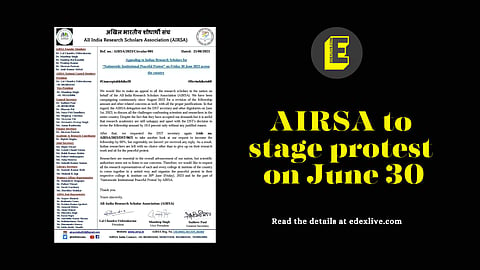

The All India Research Scholars Association (AIRSA) appealed to all the research scholars in the country today, June 29, to join their “Nationwide Institutional Peaceful Protest” against the Department of Science and Technology (DST).
The protest, which will be held across research institutions in the country, is in condemnation of the revised research fellowships introduced by the DST on June 22. To recall, the DST hiked the fellowships for Junior Research Fellows (JRFs), Senior Research Fellows (SRFs) and Research Assistants (RAs) by 19 per cent.
This hike was announced by the DST after research scholars and groups like AIRSA demanded that the research fellowships be hiked and they have been asking this since August 2022. The protesting research scholars, who had demanded a 60 per cent hike, expressed their disappointment with the new fellowship hike. AIRSA even went on to call June 22, the day of the announcement of the revised fellowships, a “Black Day for Research Scholars” in India, and announced that they would stage a protest against them on June 30.
Talking about the intent of the protest, Dr Lal Chandra Vishwakarma, Founder and President of the AIRSA, said that it is a display of dissatisfaction among the research scholars. “Despite multiple meetings with DST and them assuring that research scholars would not be disappointed, the revised fellowships are not what we demanded. We cannot accept this revision,” he said.
In an official communication posted on Twitter, the AIRSA stated, “Researchers are essential to the overall advancement of our nation, but scientific authorities seem to not listen to our concerns. Therefore, we would like to request all the research representatives from each and every college & institute in the country to come together in a united way and organise the peaceful protest in their respective colleges & institutes on Friday, June 30…”
Ninety per cent of the research institutes in India are going to be a part of the peaceful protest, confirms Lal Chandra. These include most Indian Institutes of Technology (IITs), Indian Institutes of Scientific Education & Research (IISERs) and National Institutes of Technology (NITs), Sardar Vallabhbhai National Institutes of Technology (SVNIT) in Surat, Andhra University in Vishakapatnam, North Eastern Hill University in Meghalaya, National Institute of Immunology in New Delhi, and more.
Peaceful demonstrations
As part of the protest, it has been decided that research scholars across institutions would congregate in one place, display placards and posters, and speak out on how the new fellowships would not help them from 3 pm to 7 pm.
Biswajeet Panda, a research scholar from IISER Behrampur states that the primary demand of the protesters is that the DST revises their fellowships to grant a 60% hike. Further, they also demand that the DST conduct a discussion with research scholars, listen to their concerns and attempt to resolve them.
Some institutes, like NIT Suratkal, have also planned a signature campaign to make the case of their protest stronger.
Highlighting an existential problem
AIRSA, and research scholars at large, deem this protest to be of tremendous importance, as the issue of fellowships is an issue of livelihood for them – which the DST has no choice but to pay attention to.
Birru Srinivas, a research scholar from NIT Suratkal, says that the DST must consider inflation, living expenses, and rising hostel, maintenance, and mess fees while revising the fellowships. “Otherwise, there is no point in the exercise,” he said.
In fact, Srinivas also argues that since research scholars in public institutes and universities work for the government, they must be given benefits similar to government employees. “We might be students, but we also work in these institutions as researchers. Some of us also hold teaching assistant posts. It would be helpful for us if we are given benefits like House Rent Allowance (HRA) and health insurance,” he said.
Moreover, researchers also say that it is crucial that the DST accepts their demands, as they are not sure when the fellowships would be increased next.
Biswajeet says, “Prior to this, the fellowships were hiked in 2019 and in 2014 before that. It might take five more years till the fellowship is hiked next. It would be difficult to manage our finances for that long with this fellowship amount.”
“Several of us have crossed the age of 30 and have families to take care of. With only a 19% hike in the fellowship – which is far less than the 24% given in 2019, it will be very difficult and stressful for us,” says Srinivas.
He also mentions that there have been several research scholars who have neglected their health due to lack of money, and this sometimes even led to the deaths of some of them due to unchecked ailments. He says that this is precisely why the DST must pay heed to their protests.
“The DST might talk a lot about fostering innovation and multi-disciplinary approaches to science on social media and official communication, but they mean nothing if they do not support research scholars who are working tirelessly on the ground,” Lal Chandra asserts.
Future course of action
If the DST does not consider the demands of the protest, the research scholars would stage a protest in front of the DST’s headquarters in Delhi, says Srinivas. “It is important that the DST and the UGC listen to our concerns about the new fellowships, as we will be the ones ultimately affected by them,” he adds.
Further, if the DST does accept their demands and revises the fellowships, Srinivas says that the AIRSA would move to discuss other pressing issues faced by research scholars, like strengthening the infrastructure of universities and research institutes.
“Either way, the next course of action would be decided and communicated by AIRSA, depending on the DST’s response,” says Biswajeet.
